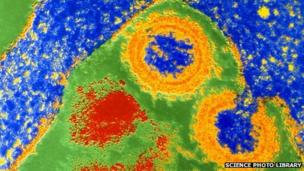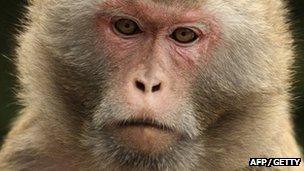Vaccine ‘clears HIV-like virus’ in monkeys
By Rebecca Morelle Science reporter, BBC World Service
11 September 2013 Last updated at 18:26

A vaccine for the monkey equivalent of HIV appears to eradicate the virus, a study suggests.
Research published in the journal Nature has shown that vaccinated monkeys can clear Simian Immunodeficiency Virus (SIV) infection from their bodies.
It was effective in nine of the 16 monkeys that were inoculated.
The US scientists say they now want to use a similar approach to test a vaccine for HIV in humans.
Prof Louis Picker, from the Vaccine and Gene Therapy Institute at Oregon Health and Science University, said: “It’s always tough to claim eradication – there could always be a cell which we didn’t analyse that has the virus in it. But for the most part, with very stringent criteria… there was no virus left in the body of these monkeys.”
Search and destroy
The research team looked at an aggressive form of virus called SIVmac239, which is up to 100 times more deadly than HIV.
Infected monkeys usually die within two years, but in some inoculated primates the virus did not take hold.
The vaccine is based on another virus called cytomegalovirus (CMV), which belongs to the herpes family.
It used the infectious power of CMV to sweep throughout the body. But instead of causing disease, it has been modified to spur the immune system into action to fight off the SIV molecules.
“It maintains an armed force, that patrols all the tissues of the body, all the time, indefinitely,” explained Prof Picker.
The researchers gave rhesus macaque monkeys the vaccine, and then exposed them to SIV.
They found that at first the infection began to establish and spread. But then the monkeys’ bodies started to respond, searching out and destroying all signs of the virus.
Of the monkeys that successfully responded to the vaccine, they were still clear of infection between one-and-a-half and three years later.
Prof Picker said his team was still trying to work out why the vaccination worked in only about half of the monkeys.
“It could be the fact that SIV is so pathogenic that this is the best you are ever going to get.
“There is a battle going on, and half the time the vaccine wins and half the time it doesn’t,” he said.
Human trials
The researchers are now testing the vaccine to see if it can be used after SIV exposure to treat and potentially cure infected monkeys.
They also want to see if the technique could work in humans.
Prof Picker said: “In order to make a human version we have to make sure it is absolutely safe.

“We have now engineered a CMV virus which generates the same immune response but has been attenuated [modified to lose its virulence] to the point where we think it is unequivocally safe.”
This would first have to pass through the regulatory authorities, but if it does, he said he hoped to start the first clinical trials in humans in the next two years.
Commenting on the research, Dr Andrew Freedman, from Cardiff University School of Medicine, said: “This suggests that prophylactic vaccines – vaccines designed to prevent infection – using CMV vectors may be a promising approach for HIV.
“While they may not prevent the initial infection, they might lead to subsequent clearance, rather than the establishment of chronic infection.”
